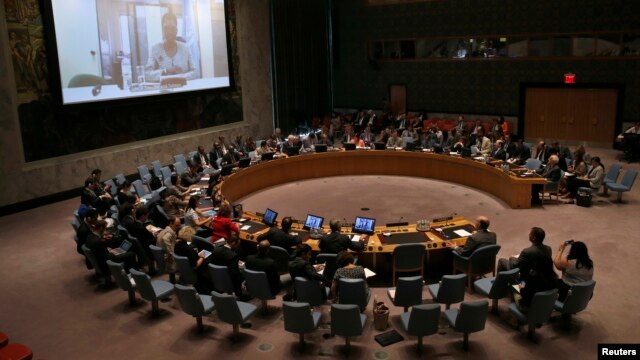UN Members to Elect 5 Countries to Security Council
FILE - Valerie Amos, United Nations Under-Secretary- General for Humanitarian Affairs and Emergency Relief Coordinator (seen on screen) briefs a U.N. Security Council meeting on the situation in the Middle East, at U.N. headquarters in New York, July 31, 2014.
October 15, 2014 10:19 PM
UNITED NATIONS—
The U.N. General Assembly will elect five new members to the Security Council on Thursday, each for a two-year term.
The outcome is mostly pre-determined before the ballots are cast. Regional groups decide which country to put up as their candidate, eliminating competition.
This year, the African Group has chosen Angola, the Latin American and Caribbean States have picked Venezuela, and Asia and the Pacific Islanders have put forward Malaysia. As long as these three candidates earn two-thirds of the voting countries’ ballots, they will join the Council on January 1.
The only question mark over the outcome is in the group known as “Western Europe and Other.” WEOG, as it is known, is not a strictly regional group, as it includes far-flung members such as Britain, Canada, Australia and Israel. In that bloc, Turkey, Spain and New Zealand are contesting two available Council seats.
The winners will replace outgoing members Argentina, Australia, Luxembourg, South Korea and Rwanda.
Carne Ross, Executive Editor of Independent Diplomat and a past member of Britain’s U.N. delegation, said getting elected to the U.N.’s most powerful body is very much about a country’s individual relations with other states, and whether a candidate can get them to commit their vote.
“This election is often seen, rather simplistically, as a kind of beauty contest for the popularity of particular countries. But actually under the surface, a lot of how it is determined is a lot to do with vote swapping between countries - you vote for me on this and I’ll vote for your judge on the ICJ [International Court of Justice] or other international bodies -- there is a lot of that going on,” said Ross.
Ross observes that once on the Security Council, states usually keep their own national interests in mind when negotiating and casting votes.
“I hope it’s different. The Council really works when diplomats think carefully about the needs of the situation on the ground, and don’t follow their ideological prejudices,” said Ross.
Of the 10 non-permanent Council members, Ross said although he knows it sounds cynical, his experience has showed him it is difficult to make a real difference.
“Because the reality is there are five countries that matter in the Security Council, and not one of them is elected. It is the Permanent Five. They decide what goes in and out of the Council, what decisions it makes about more or less everything,” said Ross.
Whichever five countries succeed in their quest for Security Council seats, there will be no shortage of problems awaiting their attention. The Council oversees matters of international peace and security, and has been grappling with an unprecedented number of crises recently in Africa, the Middle East, Ukraine and the global response to the Ebola virus.
New Council members will join the permanent five members - China, France, Russia, Britain and the United States - and five other non-permanent members - Chad, Chile, Jordan, Lithuania and Nigeria. voa



No comments:
Post a Comment